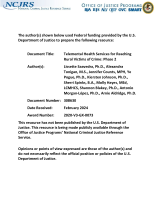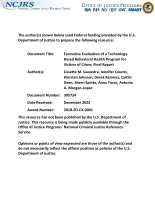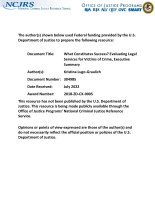Crime victim services
Neighborhood Crime Survey: An Examination of the Relationship between Immigration and Victimization
Telemental Health Services for Reaching Rural Victims of Crime: Phase 2
An Evaluability Assessment of the Not In Our Town Hate and Bias Action Teams Model
Formative Evaluation of a Technology-Based Behavioral Health Program for Victims of Crime, Final Report
The Link Between the SAMFE and Police Perceptions of Victim Credibility
What Constitutes Success? Evaluating Legal Services for Victims of Crime, A Formative Evaluation, Webinar, 2021
What Constitutes Success? Evaluating Legal Services for Victims of Crime, Executive Summary
What Constitutes Success? Evaluating Legal Services for Victims of Crime, Final Site Report: Oregon Crime Victims Law Center
What Constitutes Success? Evaluating Legal Services for Victims of Crime, Final Site Report: Maryland Crime Victims Resource Center
What Constitutes Success? Evaluating Legal Services for Victims of Crime, Final Site Report: Arizona Voice for Crime Victims
Evaluation of Technology-based Advocacy Services (ETA): Technical Report, Executive Summary
Preventing Identity Theft: Perspectives on Technological Solutions from Industry Insiders
Just Science Podcast: Just Research on Anonymous and Unreported Sexual Assault Cases
Sex Trafficking and Substance Use, Identifying High-Priority Needs Within the Criminal Justice System
Social Reactions Received by Survivors of Intimate Partner Violence: A Qualitative Validation of Key Constructs From the Social Reactions Questionnaire
Creating Culturally Responsive Services for Vietnamese-Heritage Survivors of Intimate Partner Violence.
Phase Two of ETA: Evaluation of Technology-based Advocacy Services: Assessment of Program Outcomes
Understanding the Impact of COVID-19 on Victim Service Provision: Challenges, Innovations, and Lessons Learned
The Role of Victim Services for Individuals Who Have Experienced Serious Identity-Based Crime
Testing and Validating Financial Measures with Intimate Partner Violence Survivors
National Institute of Justice 2018 Annual Report
Expanding Research to Examine the Impacts of Forensic Science on the Criminal Justice System
In 2004, the National Institute of Justice created the social science research on forensic sciences (SSRFS) research program to explore the impact of forensic sciences on the criminal justice system and the administration of justice. Much of the early research from the SSRFS program focused on DNA processing and the use of DNA in investigations and prosecutions.
See the YouTube Terms of Service and Google Privacy Policy











